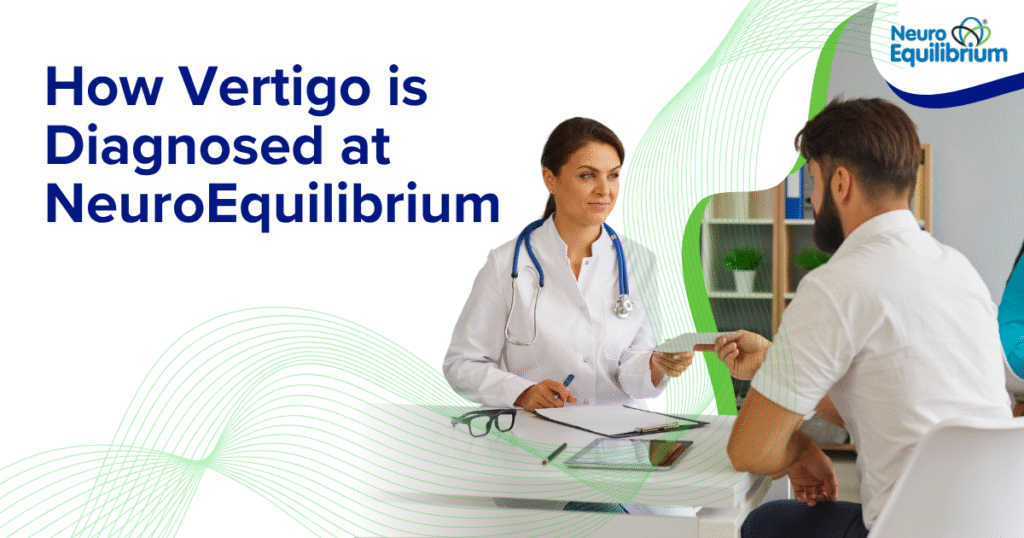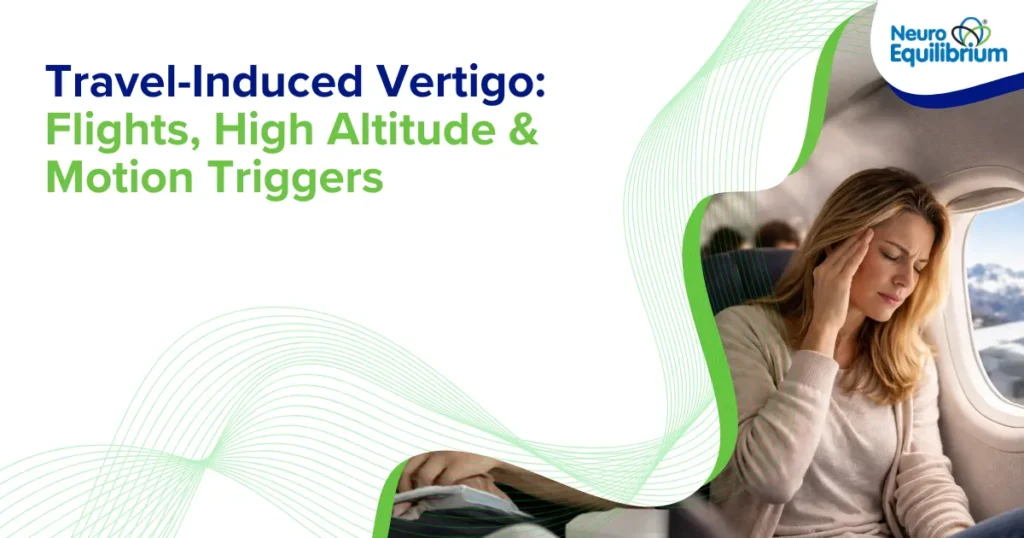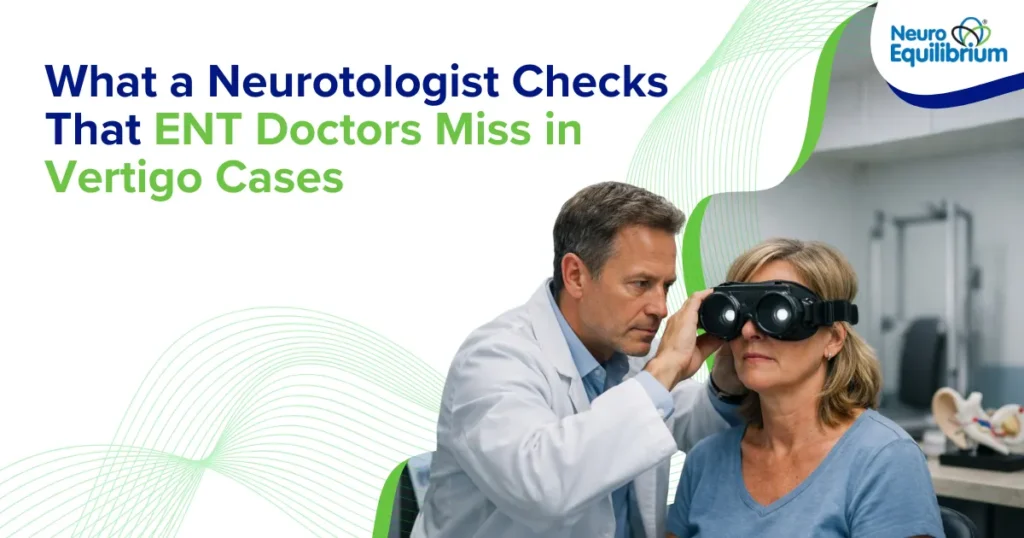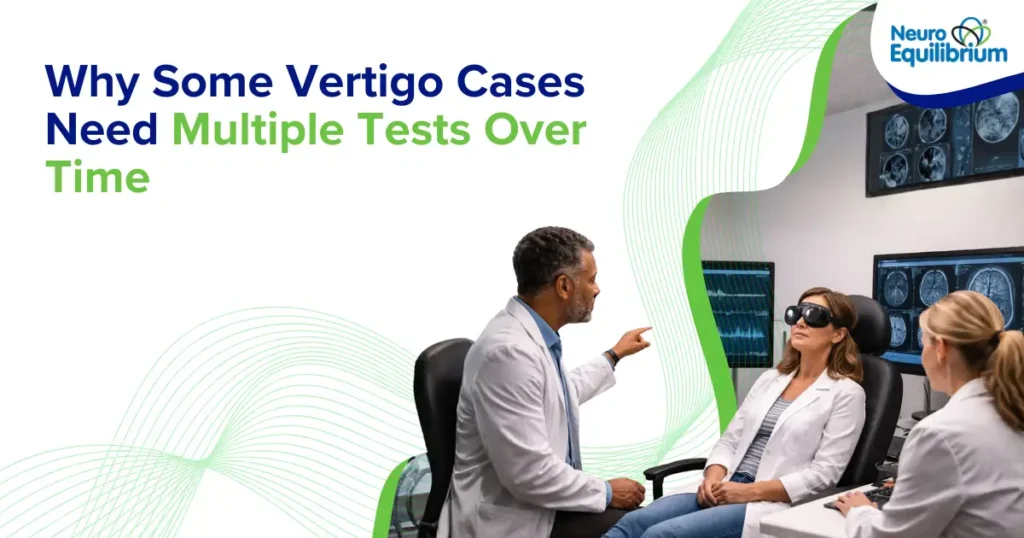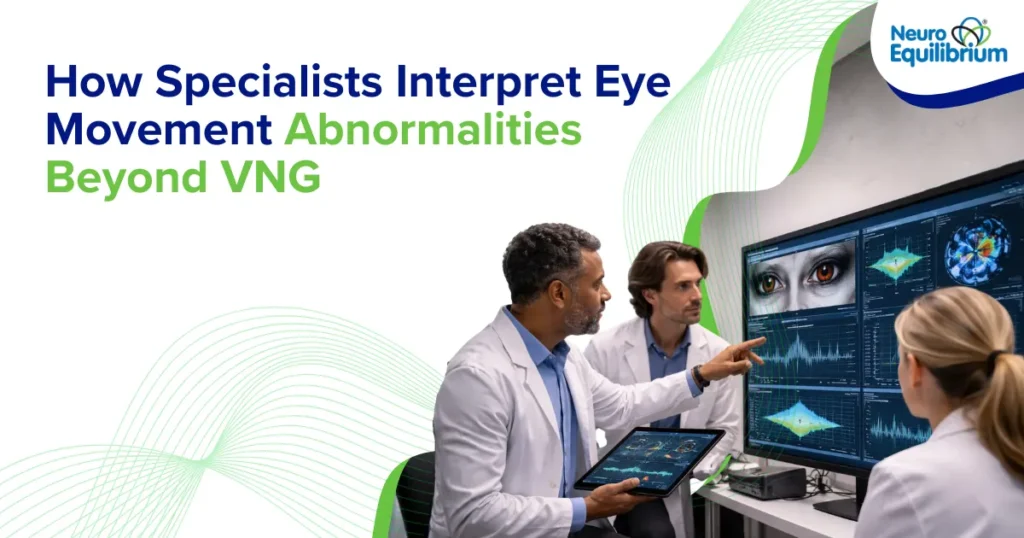Vertigo causes people to feel as though they are spinning and can create serious problems in their daily routines. Vertigo is not a disease by itself; it acts as an indication of an issue in your balance system..
Consequently, finding out the exact cause of vertigo is crucial for successful treatment. If the underlying condition is not identified, treating only the symptoms can alleviate pain for a short period but the issue may keep returning and make the problem last longer.
NeuroEquilibrium is a leading clinic chain that focuses on the accurate diagnosis and effective treatment of causes of vertigo and balance disorders.
Know More About Vertigo
- Do You Need a Vertigo Specialist?
- Difference Between VEMP and VNG Test for Vertigo Diagnosis
- Vertigo Test Cost in Bangalore: VNG, DVA, SVV & More
Importance of Finding Root Cause of Vertigo
The focus at NeuroEquilibrium is to identify the exact problem that is causing a patient’s vertigo. Since many things can cause vertigo, attempting a one-size-fits-all approach often fails. To manage a patient successfully, it is necessary to first accurately diagnose the condition and plan treatment that matches it. If vertigo is treated only by dealing with the symptom, it may not stop the condition from returning. Understanding the exact cause, whether it’s a mechanical problem in the inner ear like Benign Paroxysmal Positional Vertigo (BPPV), a neurological condition, or another disorder, enables clinicians to implement targeted therapies for long-term resolution.
Neuroequilibrium’s Approach: Comprehensive Diagnostic Process
NeuroEquilibrium stands as the world’s largest chain of specialized Vertigo and Balance clinics, with over 200+ centers in India. We have special tools and expertise to evaluate, diagnose and treat all types of vertigo and dizziness.
The process consists of:
- Detailed History Analysis: Technicians meticulously review the patient’s symptoms, medical background, and any factors that might trigger or worsen their vertigo episodes.
- Physical Examination: This includes a thorough assessment of eye movements, balance, and neurological function to identify potential signs of vestibular dysfunction.
- Specialised Diagnostic Tests: NeuroEquilibrium uses the latest technology in its equipment to perform advanced diagnostic tests, helping accurately identify the specific cause of vertigo. These tests are crucial for diagnosing the underlying disorder and guiding optimal treatment strategies. These tests include:
- Videonystagmography (VNG): VNG is an advanced diagnostic test used at NeuroEquilibrium to measure eye movements and assess the function of the balance system and brain. It includes positional tests, where the patient’s head and body are carefully moved into specific positions to trigger vertigo and observe nystagmus (jerky eye movements). The pattern of these eye movements helps doctors accurately locate the dislodged crystals in cases of BPPV (Benign Paroxysmal Positional Vertigo) and determine the specific cause of the disorder..
- Subjective Visual Vertical (SVV): This test evaluates the vestibular system’s influence on the perception of verticality, providing further information about balance function.
- Dynamic Visual Acuity (DVA): This test assesses the clarity of vision during head movements, Vestibulo-ocular reflex, a key aspect of vestibular function.
- Video Head Impulse Test (vHIT): This test specifically evaluates the function of each of the semicircular canals in the inner ear.
- Hearing Tests (Audiometry): These tests are conducted to identify any underlying inner ear disorders, such as Meniere’s disease, which can manifest with both vertigo and hearing loss.
- Neurological Examinations: By performing neurological examinations, the doctor can see if dizziness is caused by a problem with the brain or nerves.
NeuroEquilibrium creates a special treatment plan for each patient based on their test results. This may include balance exercises, simple head movements to fix inner ear issues, medicines, or working with other doctors to make sure each person gets the best care for their problem.
Use of Advanced Technology at NeuroEquilibrium
At NeuroEquilibrium, we use the latest technology in our equipment to perform advanced tests that help us accurately identify the specific cause of vertigo. This allows our doctors to make faster, more precise diagnoses and recommend the most effective treatment plans. Our technology-driven approach ensures better outcomes and a quicker path to recovery.
5. Tailored Diagnosis and Treatment Plans
At NeuroEquilibrium, we specialize in personalized care for vertigo and balance disorders. Once we identify the underlying cause of your dizziness, our expert team creates a custom treatment plan designed just for you—leveraging our state-of-the-art diagnostic tools and advanced rehabilitation protocols.
Our treatment options include:
- Vestibular Rehabilitation Therapy (VRT): Customized exercises to retrain the brain and improve balance and stability.
- Canalith Repositioning Maneuvers (like the Epley Maneuver): Especially effective for BPPV, these movements guide displaced crystals in the inner ear back to their proper place.
- Migraine Management: A multidisciplinary approach involving neurologists and lifestyle modifications for vestibular migraine.
- Pharmacological Treatments: When necessary, we prescribe targeted medication based on the diagnosis—such as antivirals for vestibular neuritis or diuretics for Meniere’s disease.
- Balance Training and Fall Prevention Programs: For elderly patients or those with chronic imbalance.
- Remote Vestibular Monitoring: A proprietary solution that allows follow-up and progress tracking from the comfort of your home.
We treat a wide range of conditions that can cause vertigo or dizziness, including:
- Inner Ear Disorders: BPPV, Meniere’s Disease, Vestibular Neuritis, Labyrinthitis, Enlarged Vestibular Aqueduct, and Acoustic Neuroma.
- Neurological Conditions: Vestibular Migraine, Stroke, Multiple Sclerosis, Brain Tumors, and Epilepsy.
- Systemic and Lifestyle-related Causes: Orthostatic Hypotension, Anemia, Diabetes, medication side effects, post-surgical dizziness, and prolonged bed rest.
- Other Triggers: Ear infections, unusual head positions, or trauma.
With a network of over 150 clinics and a centralized AI-powered diagnostic platform, NeuroEquilibrium is uniquely positioned to deliver accurate diagnosis and effective, non-invasive treatment for dizziness and balance problems.
The Network and Expertise of NeuroEquilibrium
This widespread presence of over 200+ clinics across India ensures that individuals suffering from vertigo and balance disorders can access care close to home, including for rare and complex conditions.s
Unlike general ENT or neurology services, NeuroEquilibrium is dedicated solely to diagnosing and treating dizziness and balance-related issues. Its focused approach—supported by advanced equipment and highly trained staff—results in a depth of knowledge rarely found elsewhere. With experience across a wide range of vestibular disorders, NeuroEquilibrium remains at the forefront of scientific advances, offering the most modern and effective diagnostic and treatment methods available.
Book an appointment at your nearest clinic today.
Conclusion
Vertigo can be disorienting and even frightening, but getting a proper diagnosis is essential for effective treatment and lasting relief. Without understanding the exact cause, it’s difficult to manage symptoms or find the right solution.At NeuroEquilibrium, we specialize in accurately diagnosing the root cause of your vertigo and creating a personalized treatment plan. If you’re experiencing dizziness or a sense of imbalance, don’t wait schedule an appointment with us.
Sources
- Stanton M., et al. (2023). Vertigo in Clinical Practice: Evidence-Based Diagnosis and Management. NCBI Bookshelf. https://www.ncbi.nlm.nih.gov/books/NBK482356/ (NCBI)
- “Balance Tests.” MedlinePlus Medical Test. https://medlineplus.gov/lab-tests/balance-tests/ (MedlinePlus)
- “Dizziness, Vertigo, and Imbalance Workup.” Medscape. https://emedicine.medscape.com/article/2149881-workup (Medscape)
- Ganança M.M., et al. (2015). Electronystagmography versus videonystagmography – review on evaluation of balance disorders. PMC. https://pmc.ncbi.nlm.nih.gov/articles/PMC9442181/ (PMC)
- “Videonystagmography (VNG) Medical Test.” MedlinePlus. https://medlineplus.gov/lab-tests/videonystagmography-vng/ (MedlinePlus)
- “Vestibular System Testing.” Pacific University Hearing Clinic. https://hearingclinic.pacific.edu/vestibular-system-testing/ (hearingclinic.pacific.edu)
- “Tests for Diagnosing Vestibular Disorders.” Vestibular Disorders Association (VEDA). https://vestibular.org/article/diagnosis-treatment/diagnosis/ (Vestibular Disorders Association)
- BPPV Simulation (2021) https://pubmed.ncbi.nlm.nih.gov/33841305/
- Supine Roll Test in hc-BPPV (2022) https://pubmed.ncbi.nlm.nih.gov/35711266
- Prevalence hc-BPPV in 3,975 patients (2023)-https://pubmed.ncbi.nlm.nih.gov/37664131/
FAQs
What is vertigo?
Vertigo is a feeling that you or the world around you is moving, despite being still. It is usually due to problems in the inner ear.
Book a consultation at your nearest NeuroEquilibrium Clinic today.
Why should we pay attention to getting an accurate diagnosis for vertigo?
Finding out why vertigo occurs helps treat it properly and prevents its return if the reason is not discovered.
Book a consultation at your nearest NeuroEquilibrium Clinic today.
How does NeuroEquilibrium determine what is causing a person’s vertigo?
NeuroEquilibrium employs several steps such as studying a patient’s medical history, doing physical tests, using advanced equipment for balance and using imaging if necessary.
Book a consultation at your nearest NeuroEquilibrium Clinic today.
What types of tests are done to find out if a patient has vertigo at NeuroEquilibrium?
Tests include Videonystagmography (VNG), vHIT, SVV, DVA, positional tests, audiometry, posturography, and MRI or CT scans when required.
Book a consultation at your nearest NeuroEquilibrium Clinic today.
How does VNG contribute to the diagnosis of vertigo?
Videonystagmography (VNG) tracks eye movements to detect balance system issues, particularly useful in diagnosing BPPV and central vestibular disorders.
Book a consultation at your nearest NeuroEquilibrium Clinic today.






